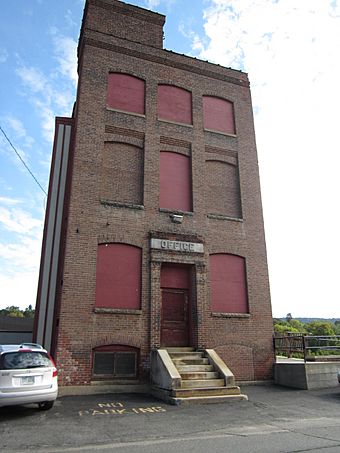Lower Village District facts for kids
Quick facts for kids |
|
|
Lower Village District
|
|

Sullivan Machine Company Office building
|
|
| Lua error in Module:Location_map at line 420: attempt to index field 'wikibase' (a nil value). | |
| Location | Along Central St. and Main St. on both sides of Sugar River, Claremont, New Hampshire |
|---|---|
| Area | 0 acres (0 ha) |
| Architectural style | Greek Revival |
| MPS | Downtown Claremont and Lower Village MRA |
| NRHP reference No. | 78003455 |
| Added to NRHP | February 21, 1978 |
The Lower Village District is a special historical area in Claremont, New Hampshire. It's located along the Sugar River, a short distance from the main part of town. This area became important starting in the 1830s. It was developed by the Claremont Mill Company. You can find it on both sides of the river, near Main Street and Central Street.
The Lower Village District
This district is famous for its old factories and homes. It shows how Claremont grew into an important industrial town.
Early Beginnings
Claremont was founded in the 1790s. However, its big growth in industry didn't start until the 1830s. People realized the Sugar River had strong currents. These currents could power machines in factories.
Because of this, the Claremont Mill Company bought a large piece of land. It was located below the town center. Between the 1830s and 1860s, they built factories and homes for workers.
Some buildings from this early period are still standing today. Many are Greek Revival style houses. Also, two main factory buildings remain. These are a brick building at 169 Main Street and the Sugar River Mill at 159 Main Street.
Growing Industry
The Lower Village District changed a lot between 1890 and 1920. During this time, the Sullivan Machinery Corporation started big operations here. They built many new factories on the south side of the river.
Because of this new development, many older buildings were taken down. They were replaced with modern factories and new homes. The current Sullivan company buildings were built then. These are next to the Monadnock Mills, which is another historic site.
Also, St. Mary's Roman Catholic Church was built during this time. On the north side of the Main Street bridge, other areas were also redeveloped. New woodworking shops, like Freeman and O'Neill, were constructed there.

